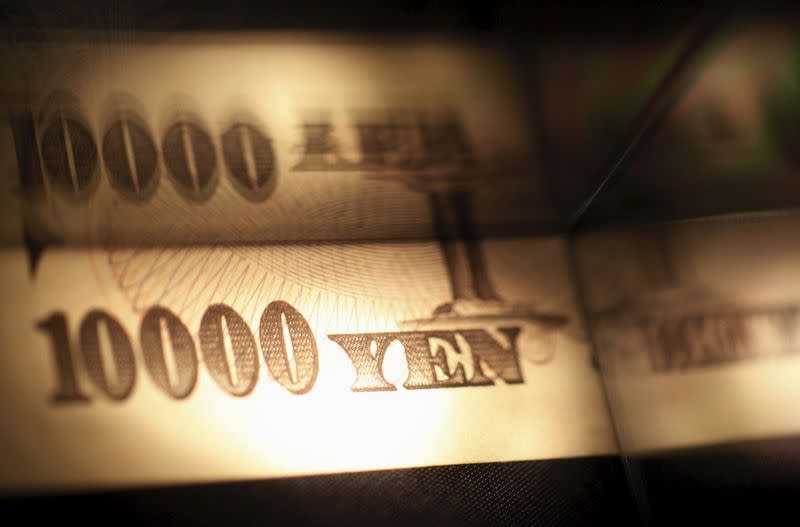Yen spikes to 18-month peak, Amazon softens Apple blow
By Wayne Cole and Nichola Saminather
SYDNEY/SINGAPORE (Reuters) - The yen surged to an 18-month peak on Friday as investors wagered the Bank of Japan might be done adding fresh stimulus to the economy, hurting prospects for Japanese exporters with a move that rippled through share markets across the Asian region.
Perhaps taking advantage of Japan's absence for a holiday, speculators smashed through the yen's previous top at 107.63 per dollar earlier this month and drove the currency as high as 107.075. It was last trading at 107.28.
It had been at 111.67 before Thursday's surprise decision by the BoJ not to ease policy further.
The euro likewise dropped to 122.21 yen, not quite managing to breach its 2016 trough around 121.71.
The sheer speed of the move stirred speculation the Japanese authorities might intervene to restrain the yen. Japanese officials on Thursday warned markets that they would be on guard even over the Golden Week holidays on Friday and next week.
Some analysts, however, seemed unconvinced over how much Japan would do to rein in the yen.
"The steady hand on Thursday is consistent with the yen being some way down the BoJ's list of priorities," noted Sean Callow, a senior currency analyst at Westpac.
"With the looming G7 meeting reinforcing the low risk of FX intervention, markets are likely to keep pressing their luck, with no obvious barrier to a test of 105."
The renewed rise in the yen has badly bruised exporters and left the Nikkei down 5 percent for the week on Thursday. While the cash market was shut on Friday, Nikkei futures on the CME were down another 1 percent at 16,170.
Markets across the region suffered in sympathy and MSCI's broadest index of Asia-Pacific shares outside Japan lost 0.4 percent, on track for a decline of 1.6 percent for the week.
Chinese shares fared a little better, with the CSI 300 index up 0.3 percent, while the Shanghai Composite index gained about 0.1 percent. They were still down 0.2 percent and 0.3 percent for the week, respectively.
South Korean stocks slipped 0.3 percent, heading for a weekly loss of 1 percent. Taiwan slid 1.1 percent, down 2.2 percent for the week.
The malaise looks set to spread to Europe, with financial spreadbetters expecting Britain's FTSE 100 to open down 0.7 percent, and Germany's DAX and France's CAC 40 to start the day 0.9 percent lower.
AMAZON JUMPS AFTER THE BELL
On Wall Street, shares took a late spill after Apple shed 3 percent when billionaire investor Carl Icahn said he no longer has a position in the tech giant.
Amazon sweetened the mood a little after the close by blowing away earnings expectations for its first quarter, sending the stock up almost 13 percent.
The Dow ended Thursday down 1.17 percent, while the S&P 500 lost 0.92 percent and the Nasdaq 1.19 percent. European shares had started weaker but steadied toward their close.
Not helping sentiment was news the U.S. economy braked hard in the first quarter to its slowest pace in two years as consumer spending softened and a strong dollar undercut exports.
Gross domestic product increased at a 0.5 percent annual rate, the weakest since early 2014.
Yet jobless claims fell again and analysts remain optimistic that payrolls data out next week will show another solid gain.
The reversal in the U.S. dollar proved a boon for most commodities with oil reaching 2016 highs for a third straight session. Brent has climbed nearly 80 percent since hitting 12-year lows of around $27 a barrel in late January.
Modest profit-taking set in on Friday, with Brent crude off 0.1 percent at $48.09 a barrel, but still poised for a weekly gain of 6.6 percent. U.S. crude held steady at $46.03, on track for an increase of 5.2 percent for the week.
The two benchmarks are still up about 20 percent in April and on track for their largest monthly gain in a year.
(Editing by Simon Cameron-Moore)

 Yahoo Finance
Yahoo Finance 

